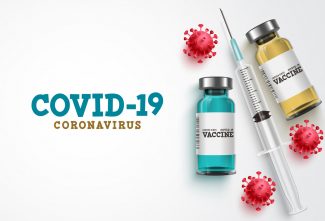Table of Contents
National Immunization Awareness Month:
Protecting Public Health Through Vaccination

National Immunization Awareness Month, (NIAM), observed every August, serves as a crucial reminder of the importance of vaccinations for individuals of all ages. By raising awareness, we can encourage conversations about immunization and ensure that people are informed and up-to-date on their vaccines by speaking with trusted healthcare providers. NIAM reinforces this message, underscoring the essential role vaccines play in protecting public health and preventing the spread of infectious diseases.
Vaccinations have significantly reduced the occurrence of illnesses such as measles, polio, and influenza, and they continue to be a vital defense against new and emerging health threats like COVID-19.
The Importance of Immunization
Immunization is one of the most effective public health interventions available. Vaccines work by stimulating the body’s immune system to recognize and combat harmful pathogens, such as viruses or bacteria. When a vaccine is administered, it introduces a weakened or inactive form of the pathogen, prompting the immune system to produce antibodies. These antibodies remain in the body, providing protection against future exposure to the disease.
The role of vaccines extends beyond individual protection. Vaccination helps prevent outbreaks of diseases that are easily transmissible and can be devastating in unprotected populations. For example, diseases like measles, which were once considered eradicated in many regions, have seen resurgences in areas with declining vaccination rates. Similarly, polio—a disease that once caused widespread paralysis—has been largely controlled due to global immunization efforts.
An essential aspect of immunization is herd immunity, which occurs when a significant portion of a population becomes immune to a disease, making its spread less likely. This protection is particularly important for individuals who cannot be vaccinated due to medical conditions or age, such as newborns or individuals with compromised immune systems. High vaccination rates are key to maintaining herd immunity and preventing the resurgence of preventable diseases.
By maintaining robust immunization programs, communities can continue to protect themselves against both well-known and emerging threats.
Immunization Requirements for Children and Adults

Vaccination schedules are carefully designed to protect individuals at every stage of life, ensuring that they receive the appropriate vaccines to prevent potentially serious diseases. Vaccine schedules, developed by public health agencies such as the Centers for Disease Control and Prevention (CDC), outline the recommended vaccinations for children, adolescents, and adults. Staying up-to-date with these vaccines is essential for maintaining both personal and public health.
For children, vaccines typically begin shortly after birth and continue throughout adolescence. Key vaccines include those for measles, mumps, rubella (MMR), polio, diphtheria, tetanus, pertussis (DTaP), and varicella (chickenpox), among others. As children enter school, booster doses help ensure ongoing immunity.
For adults, vaccines remain equally important. Adults may need to update vaccines received in childhood, such as the Tdap booster for tetanus, diphtheria, and pertussis. There are also age-specific vaccines, such as the shingles vaccine for older adults and the HPV vaccine for younger adults. Additionally, vaccines for seasonal illnesses like the flu are recommended annually for most people. Use The Adult Vaccine Assessment Tool to determine what vaccines you may need.
Learn more about Immunization Requirements for Children and Adults for more detailed information on specific vaccine requirements by age group and guidance on staying current with vaccinations. Critical vaccines like the MMR, DTaP, and HPV vaccines are essential for different age groups to help prevent life-threatening diseases. Ensuring compliance with these vaccine schedules protects individuals and contributes to the broader effort to maintain community health and prevent outbreaks.
Vaccination Benefits
With the help of science and modern medicine, vaccinations help protect children and adults from the following diseases:
- Chickenpox: A highly contagious viral infection that causes an itchy, blister-like rash. Vaccination prevents severe cases and reduces the risk of complications such as pneumonia or encephalitis.
- Hepatitis A: A liver infection caused by the hepatitis A virus. The vaccine protects against liver inflammation and long-term liver damage.
- Diphtheria: A serious bacterial infection affecting the mucous membranes of the throat and nose. Immunization prevents severe respiratory distress and other complications such as heart failure.
- Flu (Influenza): A contagious viral infection that can lead to serious complications like pneumonia. The flu vaccine reduces the risk of severe illness and hospitalization.
- HPV (Human Papillomavirus): A group of viruses linked to certain cancers, including cervical cancer. The vaccine provides protection against the most harmful strains, reducing the risk of cancer development.
- Measles/Mumps: Measles is a highly contagious viral disease causing fever, cough, and rash. Mumps causes painful swelling of the salivary glands. Vaccination prevents these diseases, which can lead to serious complications such as encephalitis or deafness.
- Polio: A viral infection that can cause paralysis and death. The polio vaccine has nearly eradicated this disease globally, preventing paralysis and disability.
- Meningococcal Disease: A bacterial infection that can lead to meningitis (inflammation of the brain and spinal cord). The vaccine prevents this life-threatening condition, which can cause permanent disability or death.
- Hepatitis B: A serious liver infection caused by the hepatitis B virus. Immunization protects against liver cancer and chronic liver disease.
- Pneumococcal Disease: An infection caused by the Streptococcus pneumoniae bacteria, leading to pneumonia, meningitis, or bloodstream infections. The vaccine protects against serious illness, especially in young children and the elderly.
- Rubella: Also known as German measles, rubella is a viral infection that can cause serious birth defects if contracted during pregnancy. Vaccination helps prevent congenital rubella syndrome.
- Rotavirus: A contagious virus that causes severe diarrhea, vomiting, and dehydration in infants and young children. The vaccine prevents the most severe cases, reducing hospitalizations.
- Tetanus: A bacterial infection that affects the nervous system and causes muscle stiffness and spasms. Vaccination prevents this potentially fatal disease, which is contracted through contaminated wounds.
- Pertussis (Whooping Cough): A highly contagious respiratory infection known for uncontrollable, violent coughing. The vaccine helps protect infants and children from severe respiratory issues and hospitalization.
Many people today have never been exposed to these diseases because a large portion of the population has received immunizations, effectively reducing the circulation of these potentially life-threatening illnesses. Vaccination ensures not only individual protection but also community-wide health safety.
COVID-19 Vaccination in Connecticut

COVID-19 vaccination remains a critical tool in managing the ongoing pandemic and protecting public health. As the virus continues to evolve, ensuring that individuals are up-to-date with their COVID-19 vaccines, including boosters, is essential for reducing the severity of illness, preventing hospitalization, and limiting the spread of the virus within communities.
For residents of Connecticut, up-to-date information about COVID-19 vaccines, testing sites, and safety guidelines can be found on the official Connecticut Coronavirus Portal. This resource provides comprehensive information on the latest vaccination protocols, eligibility criteria, and how to schedule vaccinations or boosters across the state. It also offers details on COVID-19 testing, health guidelines, and state mandates.
Healthcare providers and facilities can access the Connecticut Vaccine Program (CVP) Provider Page for the latest guidance on vaccine administration, including storage, distribution, and reporting. This page is essential for ensuring that providers follow state and federal guidelines while efficiently managing vaccine supply and distribution.
By staying informed through these reliable resources, Connecticut residents and healthcare providers can remain proactive in the fight against COVID-19, protecting themselves and their communities from the ongoing impact of the pandemic.
Interactive Resources for Parents and Patients
To make it easier for individuals to stay up-to-date with their vaccinations, the CDC offers interactive tools that can provide personalized vaccine recommendations based on a person’s age, health conditions, and lifestyle. These tools are especially useful for those who are unsure about which vaccines they or their children need.
One such resource is the Adult Vaccine Quiz, which helps adults determine which vaccines they should receive. By answering a few simple questions about their age, health history, and lifestyle, individuals can receive a personalized list of recommended vaccines. This quiz simplifies the vaccine planning process for adults who want to ensure they are protected against preventable diseases.
For parents, the Childhood Vaccine Quiz offers a similar benefit. This tool helps parents determine whether their children are up-to-date with their vaccinations based on the CDC’s recommended immunization schedule. By inputting their child’s age and vaccination history, parents receive a customized guide to ensure their child is protected against serious childhood diseases.
These interactive tools simplify the often complex vaccine planning process for families and individuals, making it easier to stay informed and proactive about immunization needs. Users can access reliable recommendations to safeguard their health with just a few clicks.
By leveraging the available resources, such as the CDC’s quizzes and official state portals, patients and parents can take control of their health and make informed decisions about vaccinations.
GWIC is dedicated to providing quality diagnostic MR imaging services including orthopedic, neurological, cardiac, breast, and other body images. We are committed to supporting your health with state-of-the-art MRI technology, including solutions for those with claustrophobia, and a compassionate team of skilled MRI technologists. Contact us today for all your MR imaging needs.


